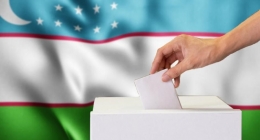firstly, the main provisions of international election standards, providing for the direct election of members of at least one of the chambers of parliament, are fully implemented into the national electoral legislation. The norms for the nomination and election of deputies of the lower house of parliament from the Ecological Movement of Uzbekistan have been excluded from the legislation, while maintaining the number of deputy seats in the Legislative Chamber (150 seats);
secondly, voters are given the opportunity to support the participation of more than one party in elections - it is stipulated that voters have the right to sign in support of one or more political parties;
thirdly, it is legally stipulated that political parties have the right to nominate a presidential candidate, a candidate for deputies of the Legislative Chamber. At the same time, political parties are entitled to nominate members of their party or non-party members as candidates;
fourthly, the rule limiting the participation in elections of persons held in places of imprisonment for crimes that do not pose a great public danger and less serious crimes has been excluded;
fifth, the number of proxies of candidates from political parties has been increased (for presidential candidates - up to 15, parliament deputies - 10, regional Kengashes (Councils) of people's deputies - 5, district and city Kengashes (Councils) - 3);
sixth, the role of observers from political parties in ensuring the transparency and democracy of elections has been strengthened. They can receive copies of documents on the election results immediately after drawing up the protocol of the election commission on the results of the vote count. A procedure has been established for immediate posting at the polling station of a copy of the protocol of the precinct election commission on the counting of votes for general review for a period of not less than 48 hours;
seventh, the procedure for consideration by election commissions of applications from individuals and legal entities on the organization, holding of elections and summing up its results has been regulated. In addition, a candidate or observer has the right to lodge a complaint about any aspect of the electoral process (including requesting a recount or invalidating election results). It is legally stipulated that decisions of election commissions, including the CEC, can be appealed in court. The persons who filed a complaint are entitled to directly participate in its consideration;
eighth, at the legislative level, the procedure for electing members of the Senate was determined, with the cancellation of the CEC Regulations on the procedure for their election;
ninth, the Electoral Code clearly defines the types, forms and methods of campaigning by political parties and their candidates;
tenthly, special attention is paid to observers, authorized representatives of parties, and the media. The Electoral Code has fixed the range of rights of the above-mentioned participants in the electoral process. The participation of these participants ensures the transparency of the electoral process. Representatives of political parties, the media, observers from citizens' self-government bodies, foreign states, and international organizations may attend meetings of the election commission. Meetings of election commissions are held openly. Decisions of election commissions are published in the media or made public in accordance with the procedure established by the Electoral Code;
eleventh, there is a Unified Electronic Voter List of the Republic of Uzbekistan, which is a state information resource containing information about citizens-voters, addresses of their permanent and temporary residence.







